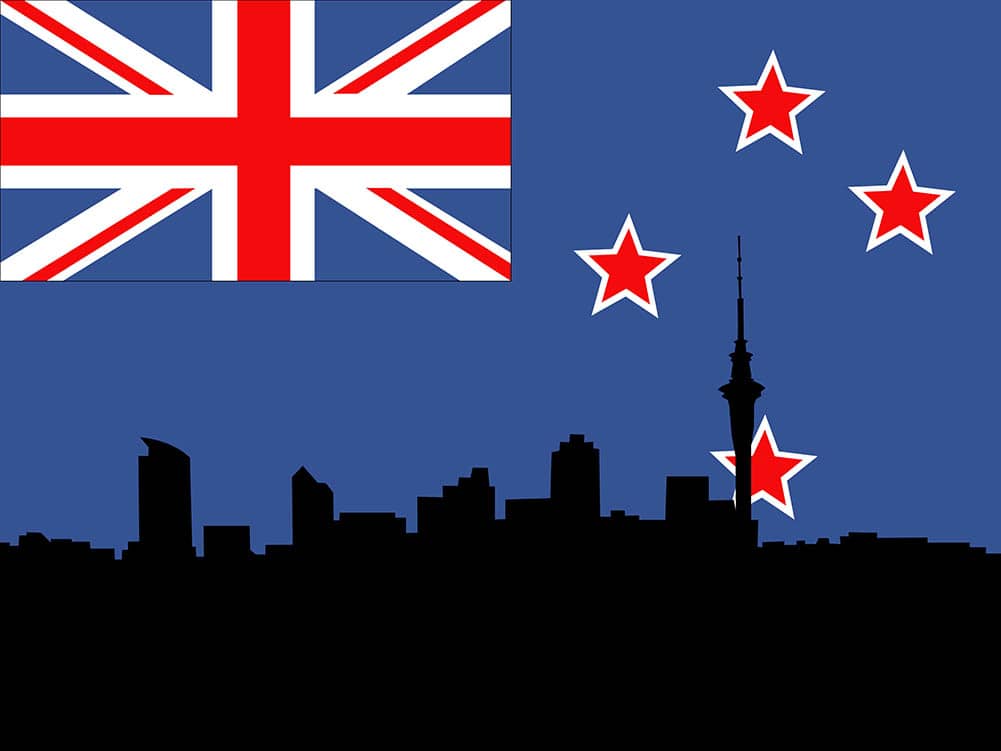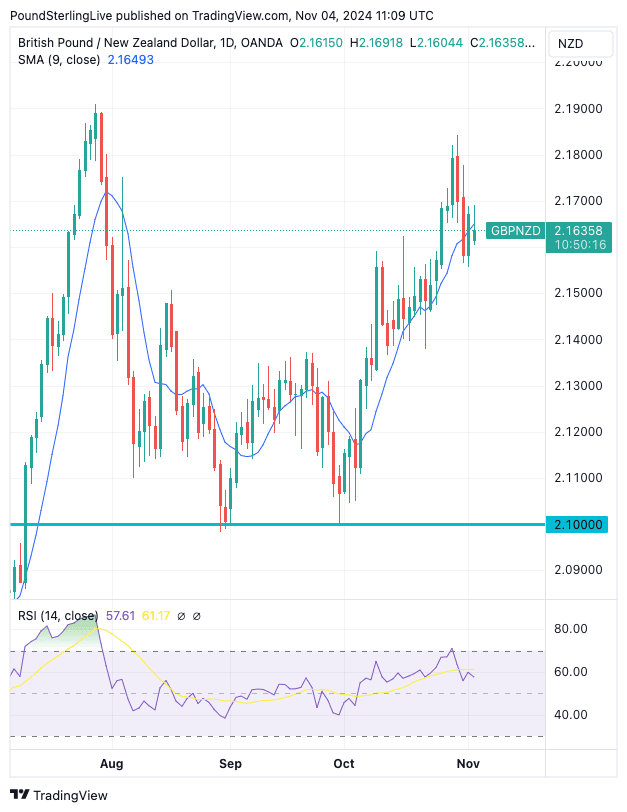Pound to New Zealand Dollar Forecast: Why a Harris Win Could Send GBP/NZD Back to 2.10
- Written by: Gary Howes
-

Image © Adobe Images
The New Zealand Dollar will stage a decent recovery this week if Kamala Harris wins the U.S. presidential vote.
However, given Donald Trump has an approximately 57% chance of winning, at least according to the betting markets, the balance of risks remains tilted against the Kiwi.
This is reflected in the Pound to New Zealand Dollar exchange rate's (GBP/NZD) skew higher, with technical indicators continuing to favour the 2024 uptrend.
Last week, we saw GBP/NZD fall in the wake of the UK budget, but the losses were relatively contained and have not materially impacted the constructive technical setup.
Front-and-centre for the Kiwi Dollar is Tuesday's U.S. presidential election, where a Trump win will trigger a potentially significant selloff that would take GBP/NZD back to highs at 2.18 in short order.
We then forecast the target at 2.19, the July high, to be tested.
"The Antipodean currencies are highly exposed to the US election," says a note from Crédit Agricole. "The AUD and NZD have high exposures to UST yields, but unlike the JPY, are negatively exposed to any risk-off trading and weaker equities in the event of a Trump election victory."
The New Zealand Dollar's sensitivity to the U.S. vote relates to its traditional exposure to China, given Trump's desire to impose significant tariffs on Chinese imports.
"Adding to the Antipodean currencies' angst is their relative high exposures to trade with China as well as their high correlations with the CNH during Trump’s first term. The AUD was an especially popular proxy for short CNH trades," says Crédit Agricole.
📈 Q2 Investment Bank Forecasts for GBP vs. NZD. See the Median, Highest and Lowest Targets for the Coming Months. Request your copy now.
The imposition of a 60% import tariff would hurt Chinese economic growth, which would, in turn, weigh on China-linked currencies such as the NZ Dollar.
China is already grappling with an economic slowdown and is expected to announce a new fiscal stimulus package this week, but analysts say authorities will wait for the election results, judging more will need to be done to counter the negatives from a Trump win.
A strong stimulus would limit NZD weakness in the event of a Trump win but would potentially turn-charge an NZD recovery in the event of a Harris win.
The NZD would be one of the biggest beneficiaries of a Harris win as this would require the recent Trump premium to be removed, resetting the market to levels seen around the start of October.
It was at this point in the election cycle that Trump started to pull ahead in the betting markets, triggering a NZD-negative reaction.
A reset on a Harris win could, therefore, imply a GBP/NZD fall back to 2.10.
Ultimately, the polling is tight and well within the margin of error, suggesting a 50/50 toss-up for the outcome.
Importantly, we have seen betting market odds return to Harris over the weekend, as punters take account of polling that shows Harris and Trump are tied in the key states that will determine the election outcome.
"Recent polls suggest that Kamal Harris has been gaining favorability in the swing states at the same time as the odds of a Trump win on betting markets continue to fall. Investors at Polymarket and Kalshi still see the former president in the lead. However, Predictit now has Harris narrowly winning the contest," says Boris Kovacevic, Global Macro Strategist at Convera.
Sterling will be in focus later this week when the Bank of England delivers another 25 basis point interest rate cut.
The Bank will also release its latest economic projections on Thursday, which should show an upgrade to inflation and growth forecasts for 2025 in the wake of the government's budget announcement.
The government's decision to spend big and borrow big is inflationary and should see the UK enjoy a sugar rush of activity in the coming months.
This will require caution from the Bank, which is only likely to cut at quarterly intervals.
"The market selloff in the wake of the autumn budget could force the BoE to prioritise restoring financial stability while also revise up its inflation outlook at its November policy meeting. A 'hawkish' cut could help the GBP stabilise," says Valentin Marinov, Head of G10 FX Strategy at Crédit Agricole.
"The outlook for higher yields to remain in place for longer now could encourage a stronger pound when the Gilt market eventually settles down," says Lee Hardman, Senior Currency Analyst at MUFG Bank Ltd.
Markets show expectations for a quarterly pace of interest rate cuts in the UK, which should ensure interest rates remain amongst the most attractive in the developed world, which will bestow support on the Pound.
The big risk to Sterling would be the Bank adopting a 'dovish' tone, whereby it tries to encourage expectations for a second consecutive rate cut in December.


